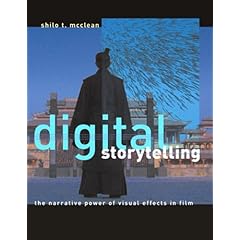 I've been reading S.T. McClean's Digital Storytelling book.
I've been reading S.T. McClean's Digital Storytelling book.Although the focus of the book is about digital storytelling and visual effects, Ms. McClean has probably the best chapter I've ever read on Story and Storycraft [Chapter 2]
Her definitions of story are spot on. She provides background from some of the greats including Socrates and Aristotle. Her descripton of the 6 elements of tragedy on page 17 are particularly well done.
She devotes one of the chapters to one of my favourite story tellers: Steven Spielberg. [Chapter 9]
Actually, the chapter speaks to the works of Spielberg, George Lucas and James Cameron [a fellow Canadian]. There is a terrific quote by Mr. Lucas. It goes like this:
"My films deal with...
- the need for humans to have friendships
- to be compassionate
- to band together
- to help one another
- and to join together against what is negative
Call up in your mind some George Lucas films and it won't be very difficult to connect the universals he speaks about in this list.
Enclosure: The enclosure in this post is one of my favourite G.L. clips. "Communication"


